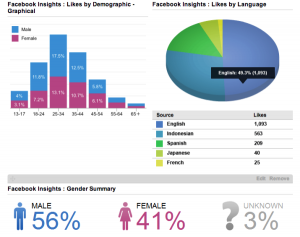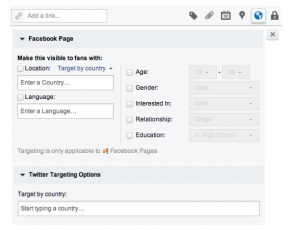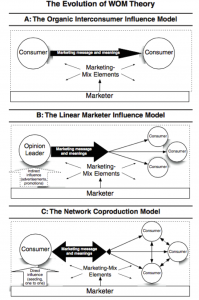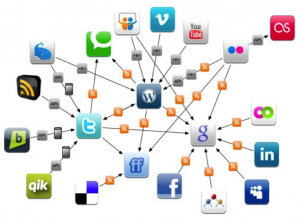Apr
2015
Are you wondering how Social Media could impact your business? Here are 10 benefits every start-up company should know..
The average person is reputedly exposed to 2,000 or more marketing messages every day, a figure that might take you by surprise! As Weber, (2009) states, marketers should participate, organise and encourage social networks in which people want to belong. This encourages vital engagement; instead of talking at customers, marketers can talk with them. The social web has become the most effective way in the history of the world to do this, on a large scale (Weber, 2009). Therefore as a start-up company, social media can be invaluable, so take a look at these HOT tips!
10 HOT benefits for start-ups:
- Easy to learn about your audience
The key to success is knowing your target market, for any business across all industries. Now social media has such a huge impact on consumers, businesses are acknowledging the impact on brand reputation (Kaplan, & Haenlein 2010). Facebook Insights in Hootsuite is a tool offering valuable information such as, age, gender and dominant languages spoken, helping to aid offers and campaigns ultimately increasing profits.

- Helps to target audiences effectively
An effective way to send marketing messages to a specific demographic or specific audience based on locations can be achieved through geo-targeting. For example, Google News site automatically identifies local content based on IP addresses and other geo-targeting technologies (George & Hogendorn, 2013). Platforms such as Twitter and Facebook have tools allowing organisations to communicate appropriate content to the appropriate audience. Hootsuite can target by; education, language, age, location and many other aspects. If you want to send out a post to people who live in London, geo-targeting is an successful tool to utilise.

- Helps to develop audience and entice new customers
An essential part of success for a start-up organisation is to expand their potential customer base and to locate current customers. Using geo-search in tools such as Hootsuite on Twitter, can allow small home furnishing start-up retailers to locate anyone tweeting about home furnishings within a selected area. After locating those twitter users, it’s possible to invite them to purchase goods using a unique promotional offer from your organisation, ultimately encouraging loyalty and potentially online and offline word of mouth marketing. Marketers are aware of the importance of this channel, which now affects the majority of all purchase decisions (Dichter, 1966).

(Kozinets, 2010)
It is important for start-ups to understand the academic theory behind word of mouth evolution, as shown in the image above, before interacting in any social media presence as poor word of moth marketing can ultimately damage brand reputation.
- Instant feedback from customers
As an organisation, being active on social media gives immediate access to strong or weak feedback. This access is incremental in providing valuable insights into customer perspective with the ability to interact, increasing brand reputation and rectifying any damaging feedback with the aim of providing excellent customer after care. If you launch a new range of home furnishing products, organisations can learn from social media which features they like or learn how they style their homes and which products they would like to be sourced. This can lead to brands bringing out new products based on what their customers desire.
- Staying ahead of your competitors
Want to access important information on your competitors? Another useful tool is social media monitoring which can improve organisations market intelligence, therefore staying abreast of all movements that can affect your own sales and profitability. This can guide strategic business decisions such as developing your organisations product range to offer diversity that competitors might be lacking.
- Increase traffic and SEO
Social media will direct people straight to your website (although only ensuring increased sales if the usability is great!). The more shares that your oganisation receives; the higher up the search engines you will be placed, showing organic growth.

(Takes, 2011)
The above diagram shows the importance and significance of each social media platform in correlation to search engines and website traffic.
- Easier & faster to share content
A vital part of ensuring engagement is making sure you organisations social media content aligns to the brand values and targeted audience. This can encourage customers to share your content and a faster rate! Businesses can use social media specifically to build awareness of new products/ranges, simply by sharing it on the organisations social network platforms that it’s active on! Easy Peasy you might that.. however it is important to emphasise the importance of relevant content. For example, as stated in my previous blog reasons that customers Unlike brands on Facebook can be for the following reasons; post too frequently, repetitive posts, stopped liking the brand in ‘real life’ and boring content. So it is important to steer clear of these.
- Meaningful customer relationships created
Social media platforms can be an excellent tool to create two-way relationships with customers and potential customers. For example, Urbanara customers can show feedback through Trust Pilot. Two-way dialogues are essential in creating customer loyalty as it is fast and very personal, something that traditional marketing campaigns will never achieve in comparison.
Still not convinced? Take a look at this blog from Clickz, on how you can build customer loyalty through social media!
- Increase brand awareness with minimal budget
Traditional advertising methods are known to have much higher costs in relation to the costs associated with social media strategies. It’s now becoming popular for companies marketing departments to start hiring community managers to adopt relations with online audiences across many regions and markets.
- Enrich the customer experience
The core function of social media is a communication channel, in the same way you would pick up a telephone to make a call or send an email. Each individual interaction poses itself as an opportunity to visibly validate your customer service skills.
It is worth taking a look at this very detailed blog from Entrepreneur, in order to understand this vital topic a lot more! How to Fire Back at an Angry Customer on Social Media
External Implications:
The above hot tips are a great guide for start-up companies if considering social media as a means to expand their brand. However, it is important to recognise that this is just a guide!
It is advised that some critical analysis should be done of the external environment, as this is likely to affect consumers and possibly the way they use social media.
For example, the following can heavily impact on a consumer and therefore your organisation:
- Economic changes – this can include inflation / tax rates which can impact consumer confidence. Ultimately you as an organisation may be active on social media but if consumer confidence is low this may not result in an increase in sales through these channels.
- Laws – consumer protection / environmental and environmental legislations are always changing. This can impact on costs and therefore may take away from the cost of having social media resourced the majority of the time.
- Changes in technology – this has become significant since the millennium. Communication technologies are evolving constantly, so it is important to be aware of latest developments as falling behind with social media channels can devalue your brand!
References:
Dichter, E. (1966), “How Word-of-Mouth Advertising Works,” Harvard Business Review, 16 (November–December), 147–66.
George, L. M., & Hogendorn, C. (2013). Local News Online: Aggregators, Geo-Targeting and the Market for Local News. Geo-Targeting and the Market for Local News
Kaplan, A. M., & Haenlein, M. (2010). Users of the world, unite! The challenges and opportunities of Social Media. Business horizons, 53(1), 59-68
Kozinets, R., Wojnicki, A. C., Wilner, S. J., & De Valck, K. (2010). Networked narratives: Understanding word-of-mouth marketing in online communities. Journal of Marketing, March
Takes, F. (2011) Search Engine Optimization. Leiden University
Weber, L. (2009). Marketing to the social web: how digital customer communities build your business. John Wiley & Sons